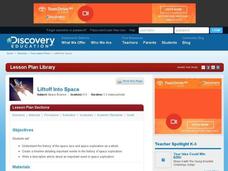Curated OER
Get a Leg Up
Traveling through space is an amazing experience, but it definitely takes a toll on the body. After reading an article and watching a brief video, learners perform an experiment that simulates the effects of zero gravity on the human body.
Curated OER
More Space About Space
In this science worksheet, students seven questions about outer space. Students are encouraged to research the given website and follow any links that interest them.
Curated OER
Communication Delay
Construct a maze in your classroom and have a blindfolded scientist act as a space rover, maneuvering unfamiliar terrain while another scientist plays commander. Classmates record the number of occurrences of the commander having to...
CommonCoreSheets.com
The Space Race
From the USSR's launch of Sputnik in 1957 to Neil Armstrong's mission to the moon in 1969, review major events in the timeline of the space race during the mid-twentieth century.
Curated OER
Mission Complete, Houston
It was a bittersweet event when the space shuttle Atlantis touched down for the last time on July 21, 2011. Space science learners read an article about this event in The New York Times and then write answers to who, what, where, when,...
Curated OER
Single Event Upsets in Aircraft Avionics
In this aircraft avionics worksheet, science fans read about the first unmanned air vehicle that collects data about the Earth and is subject to damage by cosmic ray showers. Pupils analyze two graphs of data showing the neutron flux vs....
Alabama Learning Exchange
The History of Space Exploration
Young scholars research and identify important events in the history of space exploration. They work in groups of three to four in order to research an important astronaut and record their finding on a poster board and present to the class.
American Museum of Natural History
Space and Time
Carve out some time to learn about space-time. Young scientists use a remote learning resource to read up on the relationship between space and time. They consider the idea of relativity, see how objects with a large mass can bend space...
Curated OER
Reading Comprehension 6
A great resource for advanced English language learners or native speakers working on reading comprehension. Before reading, discuss different reading strategies. Then, after they read the selection, have your class complete the multiple...
Curated OER
The Top Ten Reasons for Going Into Space
Students read and evaluate ten reasons for exploring space and prove or disprove the validity of their online information.
Curated OER
Just a "Fellow Traveler" in the Human Experience
Pupils connect the events of early space exploration to their lives today. After viewing a teacher created gallery, they discuss how the launch of Sputnik and how space exploration in general has positively or negatively affected their...
Curated OER
Space Travel Timeline
Students use the Internet to find events in space history to include in a timeline. They recognize the cause and effect relationships between events that happened in the exploration of space. They see how to use the TimeLiner software.
NASA
What Comes Next
Where is NASA going next with their rockets? A reading provides an overview of the next generation of rockets for space exploration. A full-page diagram gives the reader a scaled perspective of what this rocket may look like, for both...
Curated OER
Liftoff Into Space
Learners explore the history of space exploration. In this history of space exploration lesson, students create a timeline of space exploration. Learners watch a space video and discuss important events. Students research space...
Curated OER
HISTORY OF SCIENCE: ASTRONAUTS
Students study the pioneers of space exploration and travel; identify some of the early astronauts who prepared the way for others; examine the social and political conditions at the dawn of the Space Age; and differentiate among space...
Curated OER
Swinging on a Star
Students explore the issues that might arise if humans were to go on an interstellar space mission. They synthesize their understanding of interstellar travel by writing scenes from a science fiction novel that would depict such a mission.
Curated OER
Team Moon
Students read "Team Moon: How 400,000 People Landed Apollo 11 on the Moon," by Catherine Thimmesh. They watch portions of the movie "Apollo 13." Students use the internet and the attached study guide to discover specific information...
Curated OER
A Life Without Flight
Students explore impact of Ohio's aviation pioneers on life in America, discuss what life today would be like without people like the Wright Brothers, John Glenn, and Neil Armstrong, and brainstorm and research list of items that space...
PHET
Radiation Hazards in Space
Young scientists race from Earth to Mars and back, trying to complete mission objectives while avoiding radiation in this game for 2-4 players. To identify the winner, players must graph their mission points and radiation points at the...
Curated OER
Make a Mission
Students discuss the terms exploration and technology. They read about the MESSENGER, Mission to Mercury, and answer questions. Next, they design and plan the technology for a space mission using an online interactive activity.
Curated OER
Personal Space
Learners explore the meaning of personal space. In this social skills instructional activity, students are taught to respect others personal space by discovering their own personal space, and reading a story to identify when that...
Curated OER
Rocketry
Students design and construct a paper rocket that can be launched with a drinking straw. They participate in a lecture and read an article about rocketry and how Newton's Third Law applies to rocket launches. Each student constructs...
Curated OER
Space Science: Adventure is Waiting
These full-color handouts feature two activities. The first is a reading on comets, meteors, and meteoroids. Your space science learners will examine ten phrases and determine which of the three each characterizes. The second activity...
K12 Reader
The Art of M.C. Escher
Show your class one way in which art and math are related by teaching them about M.C. Escher. Class members read a brief passage and then respond to five related questions.

























